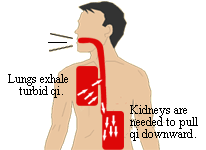I. The kidneys' relationship with the lungs
 According to the five elements theory, the relationship between the kidneys and the lungs is like a bond between a mother and child. The kidneys belong to water and the lungs belong to metal; the metal and water elements mutually generate each other. They depend on each other physiologically, and influence each other pathologically. According to the five elements theory, the relationship between the kidneys and the lungs is like a bond between a mother and child. The kidneys belong to water and the lungs belong to metal; the metal and water elements mutually generate each other. They depend on each other physiologically, and influence each other pathologically.
The lungs are the respiratory organs. By inhaling clear qi from natural air and exhaling turbid qi out of the body, it exchanges the qi between the interior and the exterior of the body. Depending on the regulation of lungs, the qi (vital energy) can circulate smoothly throughout the body, and therefore, a normal state of internal metabolism is ensured. However, respiration does not merely depend on the lungs functioning; the kidneys also coordinate it. In order to keep the qi exchange effective, the inhaled and refined qi must flow down and be absorbed by the kidneys properly. The astringent or grasping and holding function of the kidneys ensures the lungs to receive and circulate downward the qi. In this way, the former helps coordinate respiration while the latter controls respiration.
 |
| Normal respiration from a TCM perspective |
Normal respiration depends on mutual regulation by the kidneys and the lungs. The relationship is clearly stated in Leizheng Zhicai (Differential Diagnosis and Treatment of Diseases): "the lungs are the master of qi and the kidneys are the root of qi; the lungs exhale qi and the kidneys absorb refined qi; smooth respiration is the result of the harmony between yin and yang." In order to have smooth respiration and a clear airway, the kidney-qi must be strong and their astringent grasping and holding functions must be intact. When a kidney deficiency develops and fails to grasp the qi, the qi does not flow down to the kidney. It can lead to respiratory problems like difficulty inhaling with longer exhalation times. Conditions worsen during exercise. In TCM, this is called failure to retain the breathing qi in the kidney. Clinically, diseases like severe chronic bronchitis, emphysema and pulmonary heart problems that affect the right side of the heart are all due to the result of kidney deficiency and a reversed flow of qi.
|